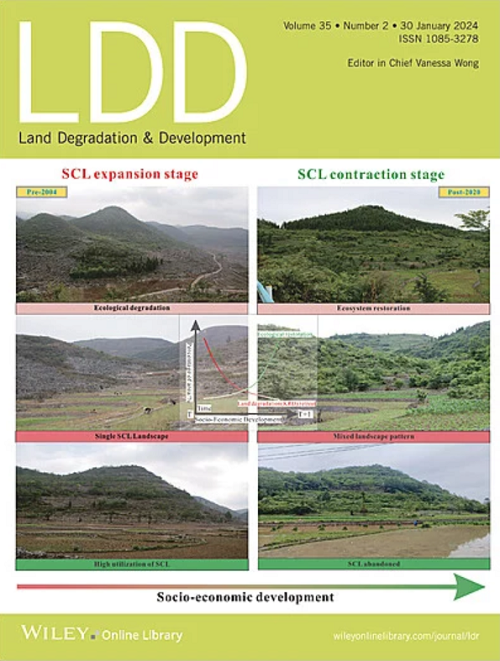Strengthening Climate Change Adaptation in Indian Agriculture: Policy Insights for Building Resilience
IF 3.6
2区 农林科学
Q2 ENVIRONMENTAL SCIENCES
引用次数: 0
Abstract
India's agricultural sector is under pressure from changing climatic conditions, placing the livelihoods of millions of farmers at great risk. Protecting this sector from these risks is essential to ensuring food security, reducing poverty, and sustaining rural livelihoods. Adaptation is a crucial strategy for achieving these goals. Based on the literature, there is a priori expectation that farmers with favorable socio-economic characteristics (higher income, education, awareness, large farm size, etc.) and institutional support should respond to climate change through adaptation. This premise remains underexplored in the literature. With a view to fill this gap, we have studied three villages in the National Capital Region (NCR) of India: Gadhi Kalanjari, Siroli, and Dharipur. Research based on mixed methods, the Mann–Kendall test, and logistic regression analysis reveals that farmers with stronger socio-economic and institutional support often either do not adopt adaptation measures or do so primarily to sustain their income, with little concern for long-term sustainability. This is evident from the fact that only 13% of surveyed farmers reported adopting any measures to mitigate the adverse effects of climate change. However, 97% of them acknowledged a decline in farm income due to extreme climate events. Furthermore, farmers with better market access are more likely to adapt, as the findings indicate that a 1% reduction in distance from the market increases the probability of adaptation by 11% points. Important suggestions for policy include improvement in extension, agromet services, community services; conducting evaluations of existing schemes in this sector to improve their effectiveness, and increasing investment in infrastructure.加强印度农业对气候变化的适应:建立抵御力的政策见解
印度农业部门正面临气候变化的压力,使数百万农民的生计面临巨大风险。保护农业部门免受这些风险的影响,对于确保粮食安全、减少贫困和维持农村生计至关重要。适应是实现这些目标的关键战略。基于文献,先验预期具有良好社会经济特征(较高收入、教育程度、意识、农场规模大等)和制度支持的农民应通过适应来应对气候变化。这一前提在文献中仍未得到充分探讨。为了填补这一空白,我们研究了印度国家首都地区(NCR)的三个村庄:Gadhi Kalanjari、Siroli和Dharipur。基于混合方法、Mann-Kendall检验和逻辑回归分析的研究表明,社会经济和制度支持较强的农民往往不采取适应措施,或者主要是为了维持其收入而采取适应措施,很少考虑长期可持续性。事实证明,只有13%的受访农民报告采取了任何措施来减轻气候变化的不利影响。然而,其中97%的人承认极端气候事件导致农业收入下降。此外,市场准入更好的农民更有可能适应,因为研究结果表明,与市场的距离每减少1%,适应的可能性就会增加11%。重要的政策建议包括改进推广、农业服务、社区服务;对该领域的现有计划进行评估,以提高其有效性,并增加对基础设施的投资。
本文章由计算机程序翻译,如有差异,请以英文原文为准。
求助全文
约1分钟内获得全文
求助全文
来源期刊

Land Degradation & Development
农林科学-环境科学
CiteScore
7.70
自引率
8.50%
发文量
379
审稿时长
5.5 months
期刊介绍:
Land Degradation & Development is an international journal which seeks to promote rational study of the recognition, monitoring, control and rehabilitation of degradation in terrestrial environments. The journal focuses on:
- what land degradation is;
- what causes land degradation;
- the impacts of land degradation
- the scale of land degradation;
- the history, current status or future trends of land degradation;
- avoidance, mitigation and control of land degradation;
- remedial actions to rehabilitate or restore degraded land;
- sustainable land management.
 求助内容:
求助内容: 应助结果提醒方式:
应助结果提醒方式:


